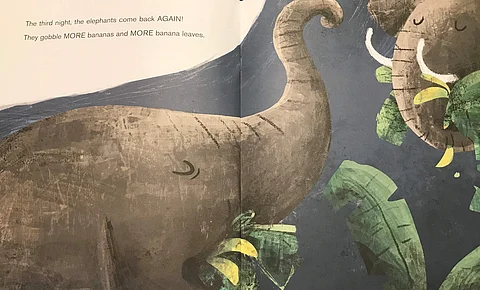

Bumoni likes bananas. Elephants like bananas. They both help themselves to the bananas from her backyard, close to the Kaziranga National Park in Assam. Now that both are eyeing the same bananas, how will the story unfold?
Bumoni's Banana Trees may seem like a children's story, which it is, but read between the lines, as with any fine piece of children's literature, and there is a beautiful subtext. Human-wildlife conflict, whether it's over bananas or beyond, is something we have been reading about and, lately, watching viral videos of as well. Remember the video of an agitated elephant in Tamil Nadu who charged at a bus? So, how can we co-exist with these gentle giants or, for that matter, any of God's creatures on Earth?
READ ALSO : Mammoth Tragedy: Student gets too close to elephant herd for a selfie, gets killed
It was one such video of vehicles honking mercilessly at elephants crossing a highway in Assam, back in 2012, that sparked the idea of this story. And when a story like Bumoni's Banana Trees comes from someone who has grown up in the periphery of Kaziranga National Park herself, that is Mita Bordoloi, it rings more true than any truth. "For the past 40 years, I've been in the US but Assam is always in my heart," says the writer. While the story was written way back in 2013, it has been updated and published by Tulika Books just last month.
Skirmishes between man and the wild are not new, but how we look at such conflict can change if we take a leaf out of young Bumoni. Once the elephant discovered the banana groves so dear to Bumoni and her family and their village too, it kept coming back for more. The villagers are an angry lot but Bumoni, being the natural leader she is, has a solution. A smart and simple one that you will have to discover for yourself when you read the book. But it's not so much the solution that does it, it's another quality that is crucial for more reasons than one. "Empathy is key, a quality that needs to be nurtured in all kids right from the start," says Mita, who has penned non-fiction books as well, and adds, "Since it is us, humans, who have started the destruction, it is for us to salvage it."
Bordoloi is also excited about the fact that the book will be published in ten languages, including Assamese. Her intention is to distribute it to different NGOs, like Hati Bondhu, Aaranyak and Wildlife Trust of India, who can then make sure it reaches the hands of children. "This is a grassroots problem that needs to be addressed at the grassroots level and hopefully, a story like this will benefit the children," she says and signs off.
